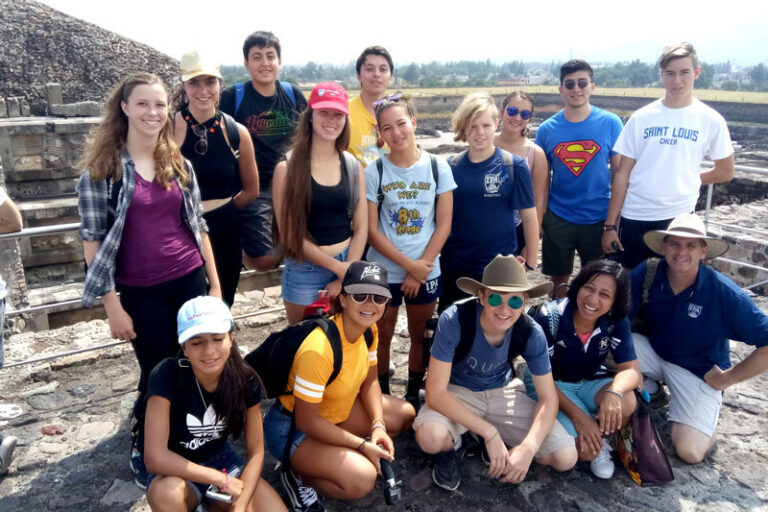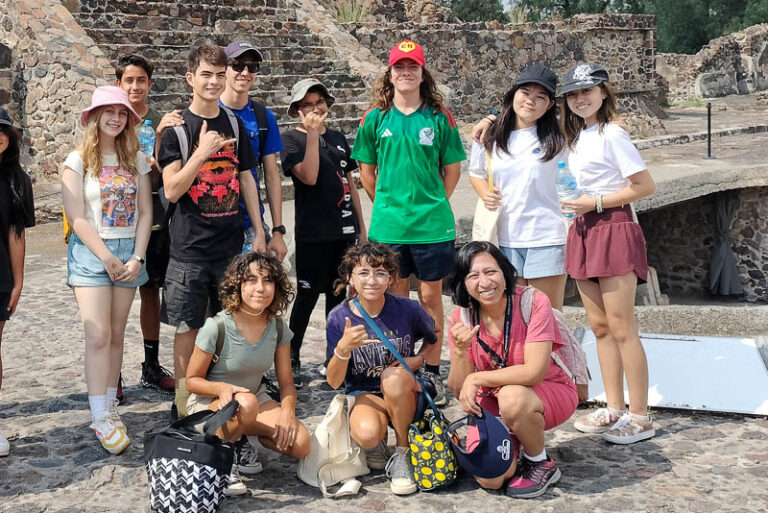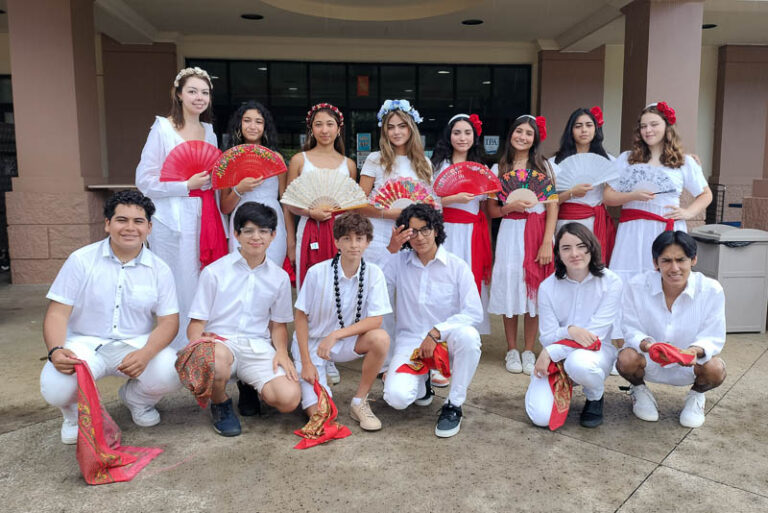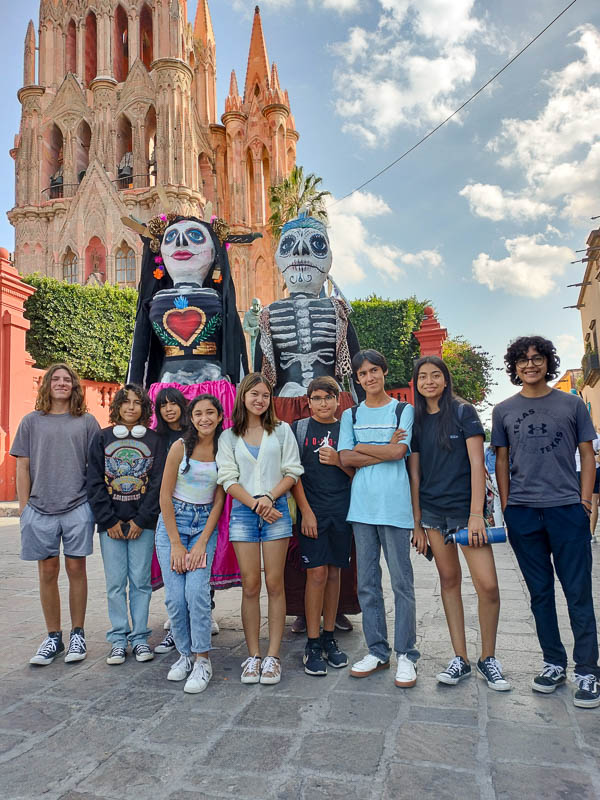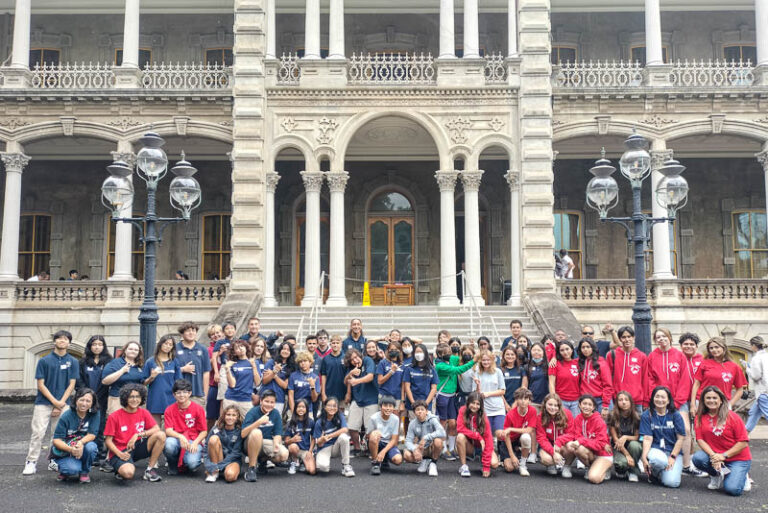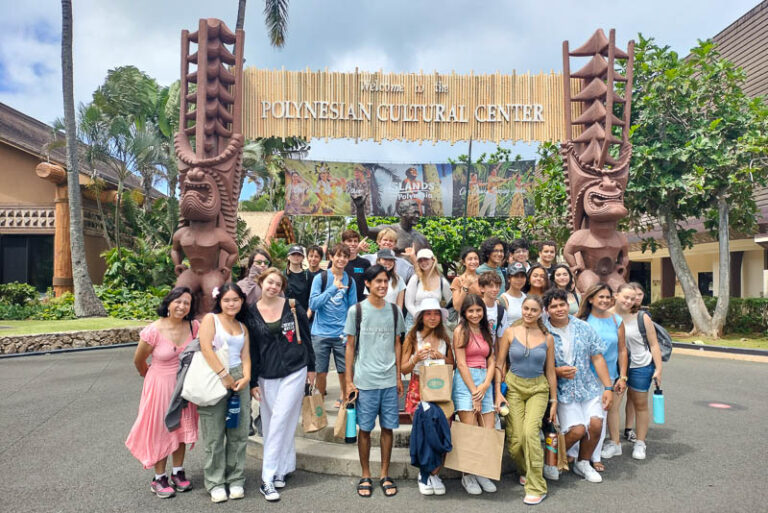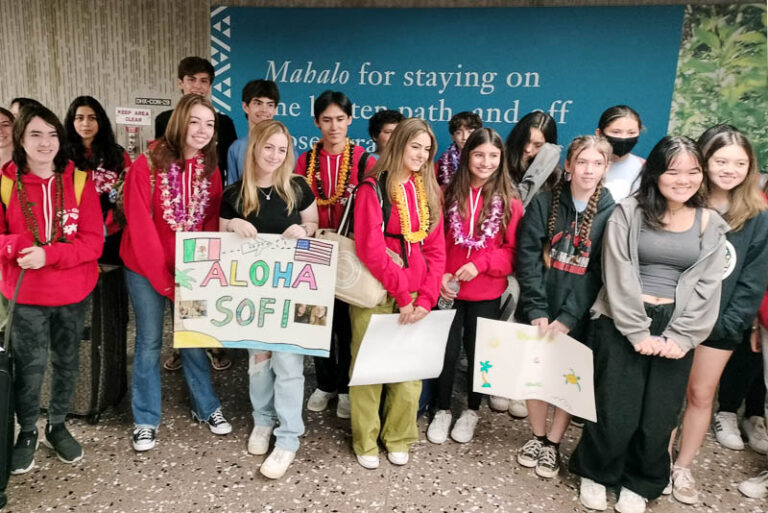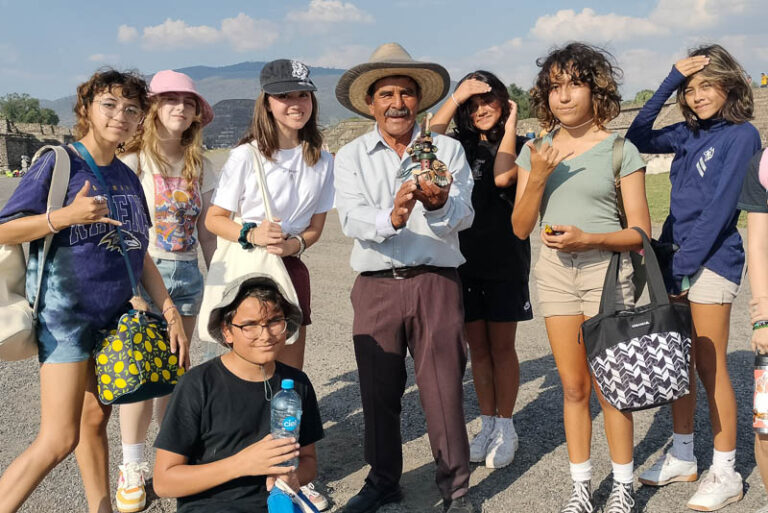Feliz Quinceañera! This year marked the 15th anniversary of Island Pacific Academy’s International Cultural and Educational Program, imagined and founded by Secondary Spanish teacher, Laura Angel Guzman. The program is an annual student exchange between Island Pacific Academy and Instituto Thomas Jefferson (ITJ), Campus Querétaro, IPA’s sister school in Mexico.
Every year during fall break, Guzman leads a group of Island Pacific Academy students on a two-week trip to Querétaro to visit the ITJ campus. And in the spring, she hosts a group of ITJ students and their chaperones at IPA for two weeks in Hawaiʻi. The relationship between IPA and ITJ has developed over the past 15 years into a strong learning partnership between middle and high school students in Mexico and Hawaiʻi.
It Began with Pencil, Paper, and a Stamp
Not long after joining the IPA faculty as a Spanish teacher in 2005, Guzman started a Pen Pals Program with ITJ. “It’s been 15 years since 2007 with just pen pals, that’s how I started,” explained Guzman. “I had the idea of, or the desire of, doing something else to offer to my students in the Spanish class. I was like just teaching in the classroom is not enough for me, I need to do something else.”
Guzman reached out to several schools in Mexico, and got a reply from the owner of ITJ who was interested in exploring the idea. The students’ earliest exchanges were handwritten letters to each other, sent through the mail, that then advanced to video conferencing, with the whole class gathered around a single video display in the MPR so the students could see each other.
“It was the old way, yes the old fashioned way,” laughed Guzman. “And it started evolving with the help of some of the people that were working at that time with us here at IPA in the Tech department. I was able to create a Wiki page and then that became like our Facebook educational page, and that was another platform that we used to communicate with the pen pals.”
That humble Pen Pals Program evolved into IPA’s International Cultural and Educational Program in 2011 when Guzman got an email from the owner of ITJ saying they were going to be in Hawaiʻi and wanted to stop by to meet in person.
“One of my proudest moments was when we were finally able to host the first group of exchange students from ITJ. This was like a dream come true, and it took five years to make this happen,” shared Guzman. “Another proud moment was when I took the first IPA Student Ambassador Delegation to visit ITJ in Querétaro. This was a large group with 12 students and five mothers, a great adventure.”
Promoting Cultural Exchange and a Global Mindset
The exchange program between students at IPA and ITJ is about much more than just learning and practicing the Spanish and English languages for the students. It’s an invaluable opportunity for students to understand different cultures, different customs, different ways of living, and different ways of seeing the world. This was all part of Guzman’s vision for the program from the very beginning.
“Part of my dream as I was younger was to become an ambassador of my country [Mexico], and so this gave me an opportunity to create that – a program where students become ambassadors and they go visit another country, another school, and they share their culture and the the traditions that they have and their education,” shared Guzman.
Danny Barretto Sr., board member of the Hispanic Chamber of Commerce Hawaiʻi, recognizes the value of the program. “The ITJ program is a way to extend the hand of fellowship and understanding of other peoples, which by nature is a way of promoting peace and tolerance,” he shared. “It’s essential to give our students the very best opportunities so they can confidently dive into their futures.”
During the exchanges, the student ambassadors stay with host families for the two weeks, immersed in the language and provided a look into the daily lives of a Querétaro or Hawaiʻi family. They attend classes with their student hosts, experiencing an international education, and on weekends they visit places of cultural and historic interest. Guzman hopes that as students learn about each other’s country, culture, and customs they will become more knowledgeable and empathic global citizens.
“My hope is to be able to help both schools to teach the students to have more empathy for what’s going on around our world, creating that feeling of responsibility and compassion of ‘I can make a change if I start with myself’,” shared Guzman. “I told them if you share what you have learned here, we’re going to be able to make a better world little by little. With the small seeds that we start planting every year with every generation that comes or goes, there’s going to be a change at some point.”
“I think [it’s] also helping the students realize that my country is not what we see on the news,” shared Guzman.”It goes beyond that – there’s a beauty, and there’s a lot of richness, and there’s people with hearts and values,” said Guzman. “And that [the Mexican people] are so willing to give, and so protective and caring when it comes to ‘I’m receiving someone in my house and I’m gonna do the best I can to make that person have the best experience’.”
Making Lasting Connections
Those connections and that insight wouldn’t happen without the generosity and hospitality of the host families, which are a main pillar of the program. This year, several of the ITJ students who came to Hawaiʻi in the spring were the same students who hosted IPA students in Mexico in the fall.
“It was very special this time. It was like closing the circle and like paying back – you hosted me, I met your family, now it’s my turn,” shared Guzman. “So they were really excited about it and it was really nice to see that.”
Mazzy McCloud ‘25 was one of those students. She was hosted by Sofi and her family in Querétaro in the fall, and she and her family hosted Sofi when she came to Hawaiʻi in the spring.
“When I went to Mexico it was my 15th birthday and quince is such a big thing and [my host] family threw me a surprise birthday party and it just felt so nice,” said McCloud. “I was away from my home on my birthday but it didn’t feel like I was missing anything. My heart was so full being with Sofi and all of my friends and her friends and her family. It was just so nice.”
Sofi echoed McCloud’s sentiments. “They welcomed me as if I was one of their own. I felt the love of everyone and each member of the family – Mazzy’s mom, Mazzy, their cats. Now I feel like Mazzy is a part of my family, like a sister.”
“She showed me what it’s like being a teenager in Mexico, and it showed the similarities between teenagers in Hawaiʻi and teenagers in Mexico. We’re similar even though we’re from completely different countries,” shared McCloud.
For Guzman, those connections are what the program is about. “It’s just given, you know, by heart to heart. And when I see families at the end of the program at the airport saying goodbye and how attached they became to the child and the child became attached to the family, it’s like it is worth it, you know. It’s a lot of work, a lot of sacrifice, but seeing that . . . it’s like it’s mission accomplished.”
Transforming Students and Families
The impact of the exchange program on the students and families who have participated has far exceeded Guzman’s expectations when she first started the pen pal exchange 15 years ago. She is in the unique position of seeing that impact from both sides, in hearing from the parents in Mexico and in Hawai’i. She has seen students take what they learned from the exchange with them into whatever they have gone on to do, with many of them now in college or graduated from college already.
One former ITJ student is now finishing his college degree and is very involved in the United Nations, helping people around the world. “His mother mentioned that because of the program he became the person that he is now. He’s being able to do so much now, and it really changed the perspective of [her] child for the better. And there’s no better pay to get, because there’s no money that will buy this experience,” said Guzman.
For one IPA family, the transformation in their son after his participation in the program was profound. “We were a little bit [worried] about having the child going because he had a lot of anxiety issues, but by the time he was there the impact because of the program . . . it was amazing. His mother was like ‘Thank you, because I got back my child’. He was so lost, didn’t have any self-confidence, hardly any friends, and now he became this amazing person – completely transformed,” recalled Guzman. “So that’s what drives me to continue, just remembering those experiences.”
Looking Ahead – The Next 15 Years
Guzman is looking forward to making the program bigger and better. She has recently expanded it even further with a program specifically for high school students called “Young Leaders of the 21st Century.” In addition to practicing their language skills, high schoolers will be able to learn from each other and see what the needs are for each other’s communities. The IPA and ITJ students would then work together to come up with plans to support the West O’ahu and Querétaro communities.
“It’s for the high schoolers to be able to now make a difference, to have an action – not just saying it, but doing it. If we could contribute to an organization in Mexico for indigenous women to help them, or if we could spend time with students that are less fortunate and we can make a change, that would be the best.”
As the program continues to grow and expand its mission, it will continue to provide transformative experiences for the student ambassadors from Mexico and Hawaiʻi and, hopefully, their communities.
“For most of these kids this will be the trip of a lifetime. In Hawaiʻi, they are able to see America in a different way, a purer way, a more natural and tolerant way. Hawaiʻi’s natural beauty is incredible and Mexico is equally beautiful,” said Barretto. “What Mexico does not have is the people of IPA, the people of Hawaiʻi and the aloha spirit that is uniquely Hawaiian. I’m happy for them and I hope they see their way back someday.”
“It’s more than just learning the language. It’s much more – it goes beyond that,” Guzman reflected. “And as I told [my students], if we would take the Hawaiian culture, the root of what it is, this would be a different world. If we could share that, I have the hope that things will change and become better for everyone.”


